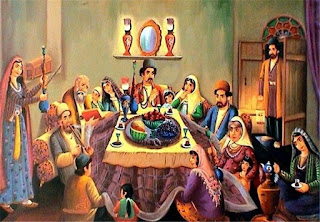History and origin of Yalda night
History and origin of Yalda night
Yalda night has its roots in the beliefs and traditions of ancient Iranians. There is no exact date for the first Yalda night in history; But according to the documents and ancient works left by the ancestors, this festival was also celebrated as an important festival in Iran during the reign of the kings who ruled Iran before the establishment of the Achaemenid Empire. With the passage of time and the influence of Islam on Iran, Yalda night remained as one of the important celebrations in the Iranian calendar and is still celebrated by the people of Iran. But in general, it can be said that Darius I added this festival to the official calendar of ancient Iranians for the first time. In ancient times, the Yalda festival was celebrated under the name "Mitrakana" or "Khor Rooz" meaning the day of the sun, in honor of the god of light, and with the advent of the Zoroastrian religion, it became "Yalda" meaning "birthday of the sun". In the Iranian calendar, Yalda night falls on the midnight of December 21 (and in leap years, December 20) or Azar 30, which coincides with the first day of winter. In this night, families and friends gather together and sit for hours until dawn and enjoy each other's presence. This celebration is associated with its own customs and is considered as a very holy night in Iranian angel counting.
The structure and terminology of Yalda
The word Yalda is originally a Syriac word; A language that has been common in today's Syria. This word found its way into the Arabic language; It has been spent in it and has created words such as: birth, birthday, birthday, born, etc. Literally, "Yalda" means "birth" and refers to the birth of Mitra, or the goddess of love, who was the guardian of the sun in Persian legends. His duty is to guard the sunlight so that it shines on the earth and causes blessings to grow. Chele night is the night when the days get longer from the day after, and that's why our ancestors believed that on the night of Yalda, Mitra opened his eyes to the world and shines more light on the earth from the day after his birth. Therefore, the main reason for celebrating and stomping on this night is the lengthening of the days after the birth of Mitra and the victory of light over darkness.
Yalda night customs
Yalda night has some special customs in Iranian culture. These customs are not the same throughout Iran and may differ in different regions; But in general, the following can be mentioned:
Lighting a fire
Fire is a symbol of the light and heat of the sun and gives good news of hope and blessing. Today, this custom is passed by lighting candles on the Yalda table.
•Reading poetry and singing
In the celebration of Yalda night, many people sing poems related to winter, love and nature. Also, singing and playing traditional instruments are part of Yalda night traditions.
• Spraying perfume
On Yalda night, some families pour a special perfume into the Yalda fire or light incense to spread a pleasant smell around; Because this act is a symbol of cleanliness.
Prayer and prayer
Yalda night is considered by many people as the night of destiny determination, so they pray for their next year and ask for their wishes and hopes for the new year.
•Hafez divination
Iranians believe that on Yalda night, God has a special opinion of his servants, and by praying to Hafez, they believe that they will achieve their wishes. Because according to the opinion of the past, this poet was the memorizer of the entire Quran and knew the divine secrets; Therefore, he can tell people about the future in his poems. The fortune-telling ceremony or tafal to Divan Hafez has had its own customs and traditions since long ago, and in most cases, the elder of the family or the white beard of the family takes fortune-telling for others and announces its interpretation.
The rituals of taking Hafez's horoscope are as follows: first, the recipient of the horoscope must make an intention and believe in the words of Hafez, then recite a fatiha for the unseen tongue, and then swear to Hafez for a good result. This phrase is usually used to swear to Hafez: "O Hafez Shirazi!" You are the confidant of every secret; I swear to God and to the horn of your plant that you will reveal to me whatever you see fit and expedient and fulfill my wish.
In the fourth stage, the fortune teller closes his eyes and holds the book with his left hand and opens a random page with the fingers of his right hand and finally chooses the right page between the two pages that have been opened; The poem on the top of the page is the result of fortune telling.
•Reading Shahnameh
Reading the Shahnameh is one of the traditional and ancient rituals of Yalda night. Ferdowsi Hakim also mentioned Yalda night in his Shahnameh. In this ritual, elders of the family read Shahnameh and explain its stories to others.
•Reading Shahnameh
Reading the Shahnameh is one of the traditional and ancient rituals of Yalda night. Ferdowsi Hakim also mentioned Yalda night in his Shahnameh. In this ritual, elders of the family read Shahnameh and explain its stories to others.
source: https://mag.sarak-co.com/yalda-night/




Comments
Post a Comment